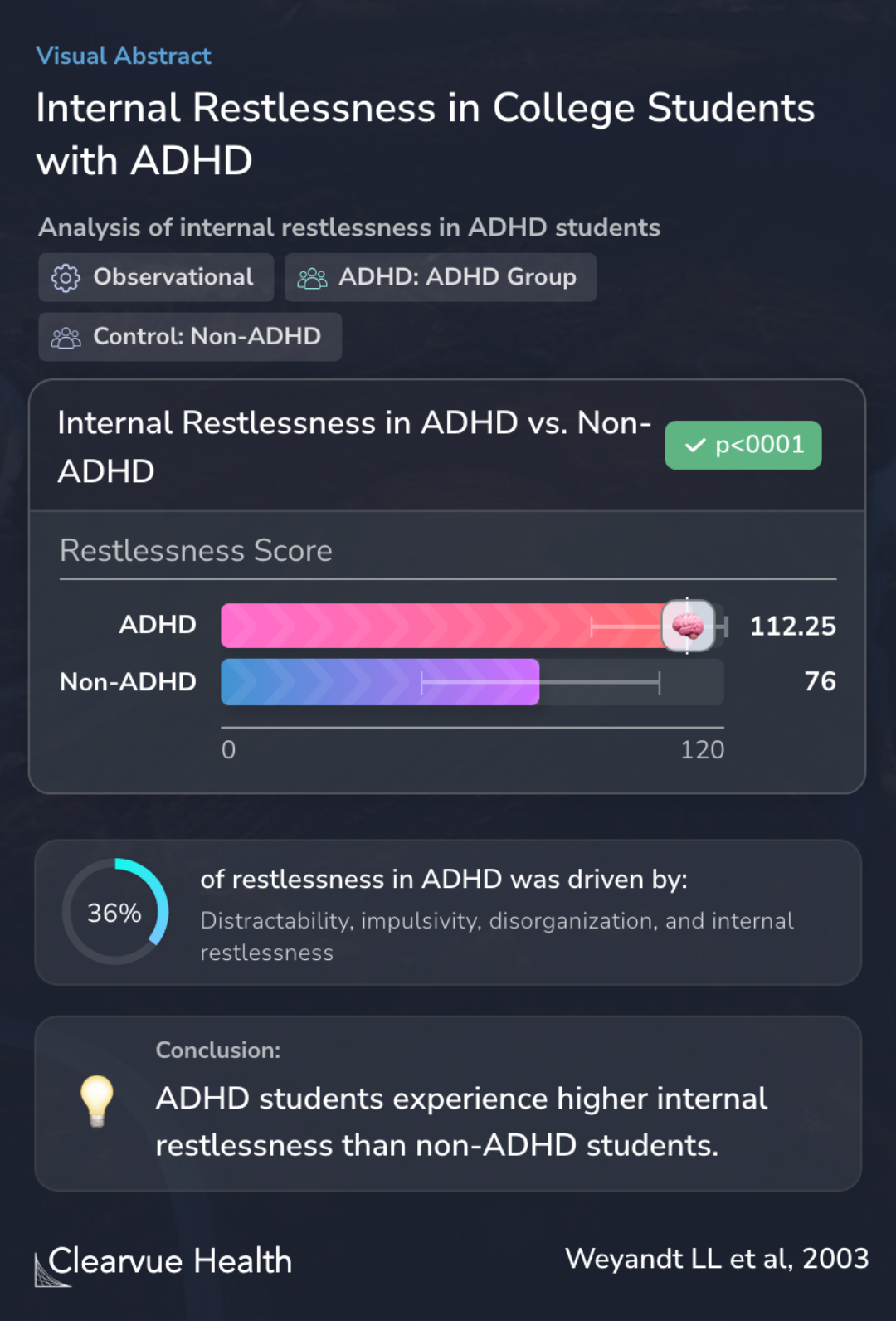The internal restlessness scale: performance of college students with and without ADHD
Internal Restlessness in College Students with ADHD
Weyandt LL;Iwaszuk W;Fulton K;Ollerton M;Beatty N;Fouts H;Schepman S;Greenlaw C;

Objectives
The study focused on understanding attention-deficit/hyperactivity disorder (ADHD) beyond childhood, particularly in college students. It's commonly believed that ADHD symptoms lessen by adulthood, but newer studies show many continue facing these challenges into adulthood. While inattention aspects of ADHD are known to persist, how hyperactivity evolves in older individuals is less clear. In adults and adolescents, hyperactivity might not be as visible, instead presenting as feelings of restlessness. To explore this specific symptom, the Internal Restlessness Scale (IRS) was developed. This tool aims to measure and understand the restlessness that individuals with ADHD might feel internally.
Attention-deficit/hyperactivity disorder (ADHD) was previously believed to be a disorder of childhood, with symptoms attenuating at the onset of puberty. Follow-up studies, however, suggest that the majority of children with ADHD continue to manifest symptoms into adulthood. Although the...
Methods
The IRS was utilized to study internal restlessness among college students, comparing those with and without ADHD. The study aimed to see if ADHD students experienced higher levels of inner restlessness than their non-ADHD peers. Additionally, the IRS was evaluated for its reliability and ability to measure restlessness over time consistently, and it was analyzed to determine its structure, which included four distinct factors.
The results of the IRS suggest that (a) college students with ADHD report significantly higher ratings of internal restlessness than college students without ADHD, and (b) the IRS appears to have adequate test-retest reliability and a four-factor structure.
Results
The findings were quite clear: college students with ADHD did report significantly higher levels of internal restlessness compared to those without the disorder. This difference was significant and measurable, as shown by the IRS scores. The IRS proved a reliable tool, holding up well over repeated tests. Moreover, the scale showed a complex structure comprising four factors that collectively contribute to internal restlessness.
The results of the IRS suggest that (a) college students with ADHD report significantly higher ratings of internal restlessness than college students without ADHD, and (b) the IRS appears to have adequate test-retest reliability and a four-factor structure.
Conclusions
The study's conclusions highlight the higher levels of internal restlessness in students with ADHD. These findings could open up new avenues for future research, particularly in developing strategies to help manage this specific aspect of ADHD in academic settings. The study underscores the importance of recognizing and addressing internal restlessness in students with ADHD to better support their educational journey.
Implications and suggestions for future research are discussed.
Key Takeaways
Context
Considering these findings, it becomes evident why students with ADHD might require additional support, even if they are on medication. Previous research by Advokat et al. in 2011 showed that medication alone might not be enough for academic success. Students with ADHD, despite medication and good study habits, often still struggle academically. This highlights the need for a more comprehensive approach to supporting these students, which includes addressing internal restlessness, as revealed in the current study.
Furthermore, improving organizational skills through behavioral interventions and simple techniques can help. These approaches enable the management of ADHD symptoms and enhance organizational abilities, aiding students in better handling their academic tasks and challenges.